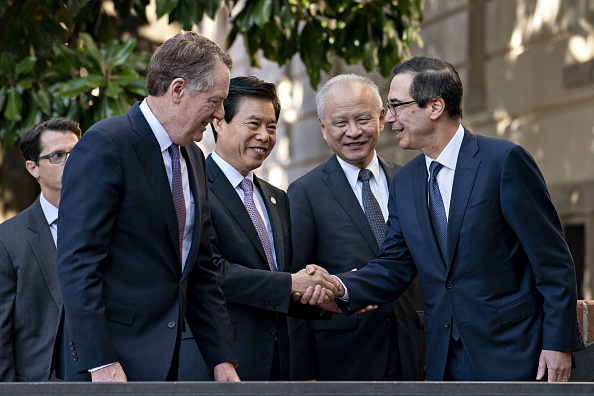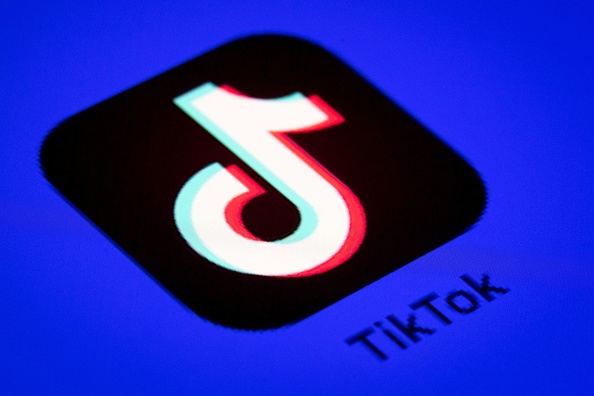
 On or Off Again?
On or Off Again?China and the United States are slowly making progress towards a Phase One trade deal in the ongoing trade war, which would likely ratchet down trade tensions between the world's two largest economies. Thus far, both countries have lowered barriers on the import of poultry, and Washington is continuing exemptions for U.S. companies doing business with Huawei. The next step would be an in-person meeting between the two trade delegations, although U.S. negotiators are allegedly reluctant to travel to Beijing for further discussions unless China agrees to make solid commitments on intellectual property protection, technology transfers, and agriculture purchases.
While China's chief trade negotiator Liu He says he's "cautiously optimistic" for a preliminary agreement between China and the US, agreements have been in striking distance before and then abruptly disintegrated-- in May of 2018 and 2019, China and the U.S. were close to reaching a deal when one side reneged on the terms. While the Phase One trade deal is smaller in scope, it could yet fall apart if President Trumps signs the newly introduced Hong Kong Human Rights and Democracy Act into law, which China vehemently opposes.
Meanwhile, in a move that may undermine the U.S. dollar's preeminence, China is considering launching its own digital currency within the next year. Chinese media has previously reported that President Xi Jinping is supportive of China developing a digital currency, and it could present a significant challenge to the United States.
 Still Simmering
Still SimmeringHong Kong remains a key flashpoint for both the U.S. and China, as both sides have taken steps in recent days to address the ongoing situation, where dozens of students are holed up at Polytechnic University, surrounded by police for a sixth day. While over 600 students have already vacated the campus, remaining protesters are said to be armed with molotov cocktails, and other flammable liquids. And members of China's People's Liberation Army, who have largely remained out of site during the unrest, have recently been seen joining Hong Kong residents in cleaning up Hong Kong's streets.
Meanwhile, a Hong Kong court's surprise decision to throw out a month-old mask band that had been introduced using colonial-era emergency powers in the case of "public danger or emergency" provoked a strong response in Beijing. The country's top legislature hinted that it may use the decision as an opportunity to rewrite Hong Kong's legal framework.
In Washington, the U.S. House of Representatives unanimously passed legislation that would require the US government to annually confirm that Beijing was maintaining Hong Kong's human rights and democracy freedoms. If not, Washington would withdraw the city's special trading status. President Trump signaled his hesitation to support the legislation on Friday, saying that "We have to stand with Hong Kong, but I'm also standing with President Xi, he's a friend of mine, he's an incredible guy."
Hong Kong is preparing for local council elections this weekend, which will widely be interpreted as a referendum for the protesters.
 Tick Tock, TikTok
Tick Tock, TikTokChina-owned social media platform TikTok is facing scrutiny from U.S. lawmakers and regulators after Senator Chuck Schumer of New York flagged the company for national security concerns. The video-sharing network, which boasts over a billion downloads and has immense popularity among teenagers, is under review by the U.S Army to determine the possible risk in the military's use of the app, which the military uses to recruit American teenagers. Over half of TikTok's US-based users are between 16 and 24, according to the company.
In response, TikTok has been making attempts to distance itself from the Chinese government, undertaking a rebranding exercise and potentially relocating to Singapore or another Southeast Asian city. In an interview with the New York Times, TikTok CEO Alex Zhu claimed that TikTok stores all user data in Virginia-- not China, and that he would personally reject any requests made by China for personal data on U.S. users.
Not everyone is convinced though, especially those weary of TikTok's Beijing-based owner, ByteDance. In a letter to U.S. Army Secretary Ryan McCarthy, U.S. Senator Chuck Schumer wrote about his concerns over "TikTok's collection and handling of user data...to support and cooperate with intelligence work controlled by the Chinese Communist Party." China-US Focus contributor Eric Harwit dives deeper into the potential challenges of a TikTok-U.S. relationship.
Prepared by China-US Focus editorial teams in Hong Kong and New York, this weekly newsletter offers you snap shots of latest trends and developments emerging from China every week, while adding a dose of historical perspective.
- 2019-11-15 Counterweight Critique
- 2019-11-08 "I haven't agreed to anything"
- 2019-11-01 Don’t Hold Your Breath
- 2019-10-25 Weaponizing Diplomacy
- 2019-10-18 Economic Shudders
- 2019-10-11 A “Big Day of Negotiations”
- 2019-10-04 Birthday Celebrations
- 2019-09-28 A World Split in Two?
- 2019-09-20 Another Round
- 2019-09-13 Olive Branch or Olive Twig?
- 2019-09-07 The Unwinnable War?
- 2019-08-31 “Sorry, it’s the way I negotiate”
- 2019-08-23 Tit for Tat
- 2019-08-17 Slowdown Ahead?
- 2019-08-09 Yuan on the Rocks
- 2019-08-02 Ratcheting Up the Crisis
- 2019-07-26 Playing Defense
- 2019-07-19 “Stain of the Century”
- 2019-07-12 Whichever Way the Wind Blows
- 2019-07-04 A Gentlemen’s Agreement
